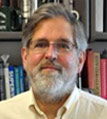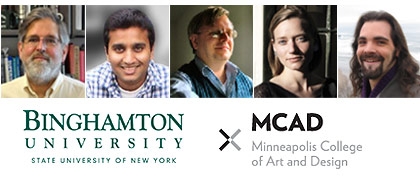On December 4th, we held the fourth in a series of webcasts that feature educators from leading colleges and universities demonstrating how Sustainable Minds is being used in education. From new sustainability degree programs to traditional engineering programs, educators from a broad range of disciplines are using Sustainable Minds to teach lifecycle thinking through hands-on experience.
This webcast showcases five educators and practitioners from bioengineering and product development as they share their success stories. Their stories demonstrate collaboration in both classroom and online learning programs for professional, graduate and undergraduate students. Educators are using sustainability to drive sophisticated product strategy creating breakthrough concepts and introducing sustainability as an alternative engineering design method focused on human experiences with the product. Following is a summary of the presentations.
Binghamton University: Introduction to Sustainable Engineering and Design
 Ken McLeod, Professor of Bioengineering, teaches as part of the minor in Sustainable Engineering. His background is electrical engineering and he conducts research at Binghamton University in chronic health conditions and product development in the world of diagnostics intervention. As part of that research, Ken has been involved in start up ventures and most of his work is in teaching innovation and entrepreneurship. Ken stated that concept development is a critical first step in sustainable engineering. The focus of his work is on conceptual design and engineering. To this end, he is translating his teaching in entrepreneurship to his teaching in sustainable product development, moving away from being focused on product design to the design of unique, sustainable user experiences.
Ken McLeod, Professor of Bioengineering, teaches as part of the minor in Sustainable Engineering. His background is electrical engineering and he conducts research at Binghamton University in chronic health conditions and product development in the world of diagnostics intervention. As part of that research, Ken has been involved in start up ventures and most of his work is in teaching innovation and entrepreneurship. Ken stated that concept development is a critical first step in sustainable engineering. The focus of his work is on conceptual design and engineering. To this end, he is translating his teaching in entrepreneurship to his teaching in sustainable product development, moving away from being focused on product design to the design of unique, sustainable user experiences.
 Sree Naresh Koneru, Teaching Assistant, is a PhD candidate at Binghamton University in Biomedical Engineering with a focus on pain management. He is currently working with Ken on device development to manage chronic pain conditions.
Sree Naresh Koneru, Teaching Assistant, is a PhD candidate at Binghamton University in Biomedical Engineering with a focus on pain management. He is currently working with Ken on device development to manage chronic pain conditions.
Binghamton University initiated a new minor in Sustainable Engineering where the intent is to introduce the concepts of sustainable engineering to students who are already enrolled in engineering majors. ‘Introduction to Sustainable Engineering and Design’ is a core course. Ken uses Ehrenfeld’s book Sustainability by Design, where Ehrenfeld emphasizes that the goal is how to make people happier and more fulfilled while also reducing the resources and energy being consumed. The course introduces whole systems thinking and how to reduce the total cost of a product while improving the user experience.
The assignment was to identify a user experience and to reduce 80% of the resources required. Students were challenged to also calculate the economic costs alongside with environmental costs. Ken described a student project examining the morning coffee experience. After identifying the main goal of this experience is to consume caffeine, the students’ proposed solution was to provide caffeine to the consumer through a different solution – contact lenses solution. They calculated a 99.6% environmental performance improvement compared to consuming caffeine through coffee. Some course key learnings are the enhanced learning experience using quantitative comparisons and that Sustainable Minds helps students evaluate and articulate environmental impacts. When discussing preparing students for industry, Ken concluded that he could see students moving into policy making or advising positions and that it is important for them to quickly demonstrate that there are greener ways to do things.
Minneapolis College of Art & Design: Master of Arts in Sustainable Design
MCAD’s Masters in Sustainable Design is a fully online program spanning departments: continuing education, online learning and graduate studies. It is exclusively for busy working pros, taught by practicing sustainability professionals. It engages a global community of students and faculty that work together to develop collaboration, leadership, design strategy, and problem-solving skills that are then applied to innovatively solve humanity’s most pressing environmental and social sustainability challenges. Sustainable Minds is used in three courses: Systems Thinking, Life Cycles, and Collaboration Product Design.
 Curt McNamara, PE is design engineer, Biomimicry Education Fellow and an Adjunct Faculty interested in connecting principles that are qualitative to life cycle analysis. He teaches Systems Thinking, for first year students to gain an overview of a systems approach to sustainability. There is a one-week LCA intro project. Curt showed student projects where they disassembled products to conduct the analysis. Students used Sustainable Minds to assess a range of simple products including a dental floss dispenser, toothbrush and an iron to understand the impacts across the life cycle stages. One of the key learnings is to identify the greatest impact and in which stage of the product’s life cycle it is occurring. Curt observed, “even though this is a very whirlwind tour through LCA the students got quite a bit out of it. They learned how easy SM is to use, it’s a systems tool that quantifies results and provides them with useful and skills the marketplace.
Curt McNamara, PE is design engineer, Biomimicry Education Fellow and an Adjunct Faculty interested in connecting principles that are qualitative to life cycle analysis. He teaches Systems Thinking, for first year students to gain an overview of a systems approach to sustainability. There is a one-week LCA intro project. Curt showed student projects where they disassembled products to conduct the analysis. Students used Sustainable Minds to assess a range of simple products including a dental floss dispenser, toothbrush and an iron to understand the impacts across the life cycle stages. One of the key learnings is to identify the greatest impact and in which stage of the product’s life cycle it is occurring. Curt observed, “even though this is a very whirlwind tour through LCA the students got quite a bit out of it. They learned how easy SM is to use, it’s a systems tool that quantifies results and provides them with useful and skills the marketplace.
 Arlene Birt is an Adjunct Faculty and works in visual storytelling, the activity of combining information design with sustainability communication. The Life Cycles course was co-developed with Curt and combines a more in-depth look at life cycles and life cycle assessment and communicating the results through information design and data visualization. In the course, students use Sustainable Minds to have real environmental performance data to tell the story in a way that consumers and people not familiar with life cycle thinking can understand in a meaningful way. Students are also able to understand the method of quantifying sustainability in more depth.
Arlene Birt is an Adjunct Faculty and works in visual storytelling, the activity of combining information design with sustainability communication. The Life Cycles course was co-developed with Curt and combines a more in-depth look at life cycles and life cycle assessment and communicating the results through information design and data visualization. In the course, students use Sustainable Minds to have real environmental performance data to tell the story in a way that consumers and people not familiar with life cycle thinking can understand in a meaningful way. Students are also able to understand the method of quantifying sustainability in more depth.
 Jeremy Faludi is a sustainable design strategist, an Adjunct Faculty at MCAD and has also taught at Stanford, Emily Carr and CCA. Jer teaches Collaborative Product Design where students learn to use green design tools and strategies working in virtual teams on real products for real companies using a ‘whole systems and life cycle design method’ in which life cycle assessment is a central part.
Jeremy Faludi is a sustainable design strategist, an Adjunct Faculty at MCAD and has also taught at Stanford, Emily Carr and CCA. Jer teaches Collaborative Product Design where students learn to use green design tools and strategies working in virtual teams on real products for real companies using a ‘whole systems and life cycle design method’ in which life cycle assessment is a central part.
Jer gave a review of the redesign process of a remote video monitoring camera. In contrast with the introductory projects, this project demonstrated a sophisticated and detailed product strategy process. Jer teaches using Sustainable Minds, as it is the simplest LCA tool available that can be used so solve a broad range of product development challenges. Students’ key learnings include how to determine the priorities for greener design; that LCA can decide design winners as it’s a valuable tool to filter ideas by greatest environmental performance improvement; and that whole systems thinking can lead to more radical re-design. Educators’ key learnings include how to build eco-impact literacy in students to build technical and analytical skills, and a better design process with wide creativity and quantitative rigor – all highly valued in the marketplace.
Summary
This range of stories in this webcast expresses the creativity of the educators integrating life cycle thinking and life cycle thinking into a range of curriculum by discipline and level of complexity – from ideation and exploration and benchmarking to information visualization. Watch for more webcasts in this series, where we showcase more educators learning new things, building on what they know and getting started teaching in new ways.
If you’d like to learn about our Education Programs including class, department or unlimited subscription packages; curriculum, training and support, contact us at (617) 401-2269 or sales@sustainableminds.com







 Feed: blog
Feed: blog
 Ken McLeod, Professor of Bioengineering, teaches as part of the minor in Sustainable Engineering. His background is electrical engineering and he conducts research at Binghamton University in chronic health conditions and product development in the world of diagnostics intervention. As part of that research, Ken has been involved in start up ventures and most of his work is in teaching innovation and entrepreneurship. Ken stated that concept development is a critical first step in sustainable engineering. The focus of his work is on conceptual design and engineering. To this end, he is translating his teaching in entrepreneurship to his teaching in sustainable product development, moving away from being focused on product design to the design of unique, sustainable user experiences.
Ken McLeod, Professor of Bioengineering, teaches as part of the minor in Sustainable Engineering. His background is electrical engineering and he conducts research at Binghamton University in chronic health conditions and product development in the world of diagnostics intervention. As part of that research, Ken has been involved in start up ventures and most of his work is in teaching innovation and entrepreneurship. Ken stated that concept development is a critical first step in sustainable engineering. The focus of his work is on conceptual design and engineering. To this end, he is translating his teaching in entrepreneurship to his teaching in sustainable product development, moving away from being focused on product design to the design of unique, sustainable user experiences. Sree Naresh Koneru, Teaching Assistant, is a PhD candidate at Binghamton University in Biomedical Engineering with a focus on pain management. He is currently working with Ken on device development to manage chronic pain conditions.
Sree Naresh Koneru, Teaching Assistant, is a PhD candidate at Binghamton University in Biomedical Engineering with a focus on pain management. He is currently working with Ken on device development to manage chronic pain conditions. Curt McNamara, PE is design engineer, Biomimicry Education Fellow and an Adjunct Faculty interested in connecting principles that are qualitative to life cycle analysis. He teaches Systems Thinking, for first year students to gain an overview of a systems approach to sustainability. There is a one-week LCA intro project. Curt showed student projects where they disassembled products to conduct the analysis. Students used Sustainable Minds to assess a range of simple products including a dental floss dispenser, toothbrush and an iron to understand the impacts across the life cycle stages. One of the key learnings is to identify the greatest impact and in which stage of the product’s life cycle it is occurring. Curt observed, “even though this is a very whirlwind tour through LCA the students got quite a bit out of it. They learned how easy SM is to use, it’s a systems tool that quantifies results and provides them with useful and skills the marketplace.
Curt McNamara, PE is design engineer, Biomimicry Education Fellow and an Adjunct Faculty interested in connecting principles that are qualitative to life cycle analysis. He teaches Systems Thinking, for first year students to gain an overview of a systems approach to sustainability. There is a one-week LCA intro project. Curt showed student projects where they disassembled products to conduct the analysis. Students used Sustainable Minds to assess a range of simple products including a dental floss dispenser, toothbrush and an iron to understand the impacts across the life cycle stages. One of the key learnings is to identify the greatest impact and in which stage of the product’s life cycle it is occurring. Curt observed, “even though this is a very whirlwind tour through LCA the students got quite a bit out of it. They learned how easy SM is to use, it’s a systems tool that quantifies results and provides them with useful and skills the marketplace. Arlene Birt is an Adjunct Faculty and works in visual storytelling, the activity of combining information design with sustainability communication. The Life Cycles course was co-developed with Curt and combines a more in-depth look at life cycles and life cycle assessment and communicating the results through information design and data visualization. In the course, students use Sustainable Minds to have real environmental performance data to tell the story in a way that consumers and people not familiar with life cycle thinking can understand in a meaningful way. Students are also able to understand the method of quantifying sustainability in more depth.
Arlene Birt is an Adjunct Faculty and works in visual storytelling, the activity of combining information design with sustainability communication. The Life Cycles course was co-developed with Curt and combines a more in-depth look at life cycles and life cycle assessment and communicating the results through information design and data visualization. In the course, students use Sustainable Minds to have real environmental performance data to tell the story in a way that consumers and people not familiar with life cycle thinking can understand in a meaningful way. Students are also able to understand the method of quantifying sustainability in more depth. Jeremy Faludi is a sustainable design strategist, an Adjunct Faculty at MCAD and has also taught at Stanford, Emily Carr and CCA. Jer teaches Collaborative Product Design where students learn to use green design tools and strategies working in virtual teams on real products for real companies using a ‘whole systems and life cycle design method’ in which life cycle assessment is a central part.
Jeremy Faludi is a sustainable design strategist, an Adjunct Faculty at MCAD and has also taught at Stanford, Emily Carr and CCA. Jer teaches Collaborative Product Design where students learn to use green design tools and strategies working in virtual teams on real products for real companies using a ‘whole systems and life cycle design method’ in which life cycle assessment is a central part.